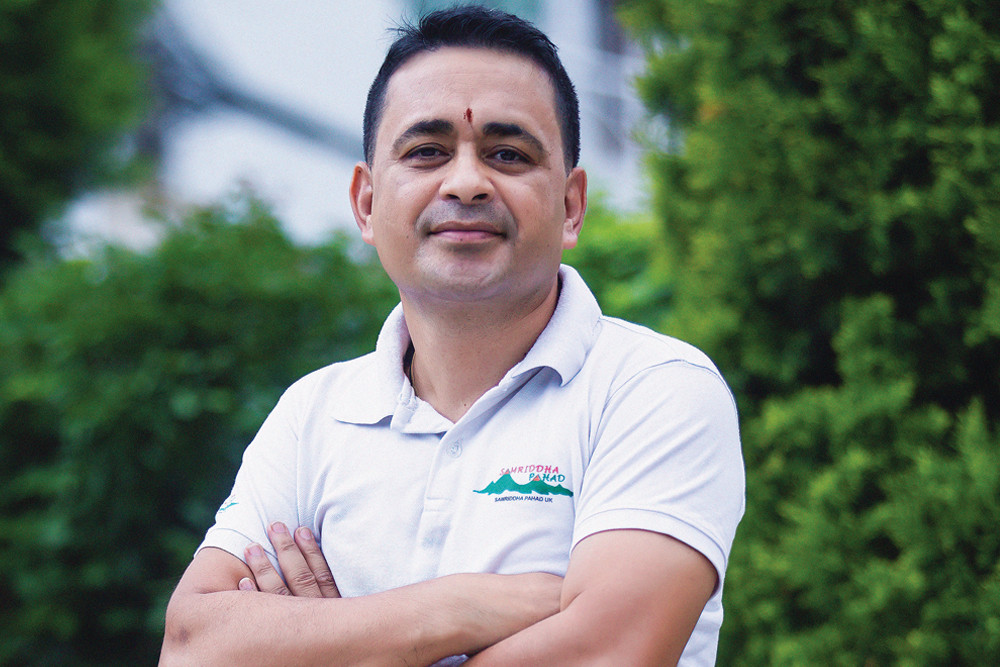
Dr. Keyoor Gautam is a pathologist and the Chairman of Samyak Diagnostic Pvt. Ltd. He acquired his MBBS degree from Saint Louis University, the Philippines and completed his MD in Pathology from Kasturba Medical College, India under the postgraduate program from Kathmandu University. He has further specialised in Oncopathology from Tata Memorial Hospital, Mumbai, India.
Dr. Keyoor’s career as a pathologist spans more than a decade and started with the Nepal Medical College. He joined Grande International Hospital in 2012 as the Head of the Department of Pathology and helped establish its laboratory system. With a vision to provide quality laboratory service in the country, he established Samyak Diagnostic in 2014 as a benchmark of a modern pathology lab. Under his leadership, Samyak Diagnostic became Nepal’s first ISO 15189 accredited pathology laboratory.
He is an international faculty for the Foundation for Quality India (FQI) and has trained many laboratory professionals. He has worked as a quality consultant at NPHL (National Public Health Laboratory) for ISO 5189 accreditation of the national lab and has helped establish six local level laboratories in Rukum district. He was also involved in establishing the pathology lab of Nepal Police Hospital. Dr Keyoor and his venture have played a vital role in helping AERSSC, the local accreditation body of Nepal, in achieving MRA signatory status of International Laboratory Accreditation Cooperation which has led to international recognition of lab reports released from ISO 15189 accredited pathology lab from Nepal.
In an email interview with B360, he shares his definition of leadership and why the establishment of Samyak Diagnostic remains his most prized accomplishment till date.

What’s your definition of a leader?
A leader is a person who is a visionary and is passionate about his or her work and can lead the group to achieve higher goals as a team for the benefit of the institution as well as the team.Is leadership ‘in-born’ or ‘acquired’?
Our thought, perceptions and decisions are all based on our past experiences. Leadership may be little of an inherent quality but it is predominantly moulded by our past experiences and triggered by certain circumstances or life situations that we experience. And yes, I believe that the majority of leaders are born as per the time demands.Who comes to your mind as ‘an ideal leader’?
I have found leadership in people from various walks of life. For me an ideal leader would be any person who is passionate in his or her work and will give one hundred percent in what is being done. All of us are ideal leaders in one way or another, just the scale of followership changes. You can be an ideal leader at home to your family, or at your office, or in your country or globally too. It is just a matter of how passionate and committed you are towards your ambition and dream.Could you share with us any incident that tested your leadership ability?
Three major challenges we Nepalis faced in the last decade was the earthquake and blockade in 2015, and then the Covid 19 crisis in late March, 2020. Being in the health sector, we had to close our service for just one week after the earthquake and for only five days during the initial lockdown last year due to Covid infection. 2015 posed as a major challenge for me and the company. We were a new company that had not even celebrated its first anniversary, and we were preparing for an International inspection for ISO 15189 accreditation. Essentially, we went through tough times. Challenges were everywhere and from all angles. Stress and anxiety among staff and financial crunches were the major issues faced after the earthquake. People’s priorities had changed and we faced a financial crisis due to lack of regular testing by patients since they showed unwillingness to visit the hospitals. Problems had to be solved. We decreased our working hours to half-day and had our staff join duty every alternate day. This helped decrease our overhead expenses and at the same time, we provided alternative day rest to our staff so that they could spend some time with their loved ones. The best part is that the organisation paid them full salary even though they worked half of the allocated time. This was actually a motivating factor for the staff and it has helped Samyak gain a good reputation as an institution where the staff come first. Happy workers are productive workers. Two major problems were faced during the blockade, one was petroleum shortage with frequent power cuts and another one was financial constraints once again since our priorities had shifted with wellness and health care becoming secondary. Covid 19 crisis in early 2020 was a plunge into the unknown. I still remember that we had to open on the fifth day of lockdown after I got a few calls from some recent renal transplant patients who were on the immunosuppressant drug and had to monitor their levels via blood tests. Now motivating the staff to enter the war zone was a challenge. Even if the team members were ready to come to work, their family pressure was high. As before, I cut down our working hours so that we could cater to patients in emergency, and then did alternate duty for the staff. So as a leader, what must have helped me motivate them in these difficult times? Well, I have realised that a leader must lead the show, be with the team and carry them along. I made sure that I came to work every day, even on Saturdays. I used to stay at the lab the whole time from opening to closing time and made my staff as well as patients comfortable when they came for tests. My persistence and commitment at work must have motivated all my staff and colleagues. As far as the finances were concerned, it was a challenge, and this challenge was taken as an opportunity. We were compelled to think and work on various modalities of marketing and business promotion. This helped us to spring back within a few months of the end of crisis time. Lesson learnt was that every situation, whether good or bad, can be taken as an opportunity to do better or as an opportunity to learn from. Since we as an organization survived these turmoil filled times, our confidence level is higher than ever that we can tackle any crisis and get back in no time.
How important is it for a leader to have a good team to work with?
Nothing is possible without good teamwork. But just having a team is not enough. A leader must know the qualities of all the team members and assign them work as per their capabilities and expertise. A leader should have the ability to spot the good in everyone and make the most utilization of it for the betterment of the institution as well as to sharpen the skills of that team member. Frequent appraisals and a simple thank you will help in any job well done. A leader should also have the ability to learn from his team, whether it may be from a fresher or a senior team member. This openness to learn and discuss will bring out the best in them.When should leaders hand over the leadership position?
In reality leadership position is handed over if the leader plans to retire due to various conditions, sees another opportunity where he feels like he can do a better job, or feels that his successor can do a better job in leading the organization. It is a gut feeling in any profession when you should make the decision to hand over the baton, and most good leaders know the right moment to do so.A book on leadership that you want to recommend
“The Leader Who Had No Title” authored by Robin Sharma. A very simple book to read but with a lot of motivation for all of us who have the leadership within. As the title suggests, we do not need a position to lead. We can be leaders in many aspects of life. The book motivates us to do the best every day and make it possible to better each day. It teaches us to inspire, influence and elevate each person and basically be a good human being through respect for others, kindness and appreciation. A good leader should first become a good person. It also teaches us about how persistence, passion, empathy and love for your work will make you a good leader, and a happy one too.What do you consider your most significant accomplishment as a leader?
Establishing Samyak Diagnostic, the first ISO 15189 accredited pathology laboratory in the country is the most significant accomplishment and contribution of mine to our society. Results released from an ISO 15189 accredited pathology laboratory will now be recognised in more than 80 developed countries worldwide. This has raised the standard of pathology laboratory service in the country and Samyak Diagnostic has served as a benchmark of quality and an ideal pathology laboratory. Now treating doctors as well as patients are assured of an internationally recognised quality lab report from Nepal. The story just doesn’t end here. May it be for providing quality service to patients or as a sense of competition with us, the need for accreditation of pathology lab has been the talk of the town. More and more laboratories and doctors are asking for training on ISO 15189 and the process of accreditation. Whatever may be the reason for other labs to start thinking of accreditation, we Nepalis are the beneficiaries since we shall be provided with accurate and reliable quality results. I am happy that my six years of being vocal and advocating laboratory accreditation is finally making progress for the good of all Nepalis.Does gender affect leadership role?
Both men and women have been leaders in various disciplines. More men are seen as leaders early in life, but you must realise that a woman’s full-fledged career starts a bit late, like in the early or mid-thirties due to family obligations. Family support for ladies is the key to help her exhibit the leadership qualities in her. Additionally, women are known to have more empathy and nurturing character in them, they will do a better job in both employee satisfaction as well as client satisfaction. Hence, I don’t think that leadership role is affected by gender.
Published Date: June 30, 2021, 12:00 am
Post Comment
E-Magazine
RELATED Leadership


.jpg)


.jpg)